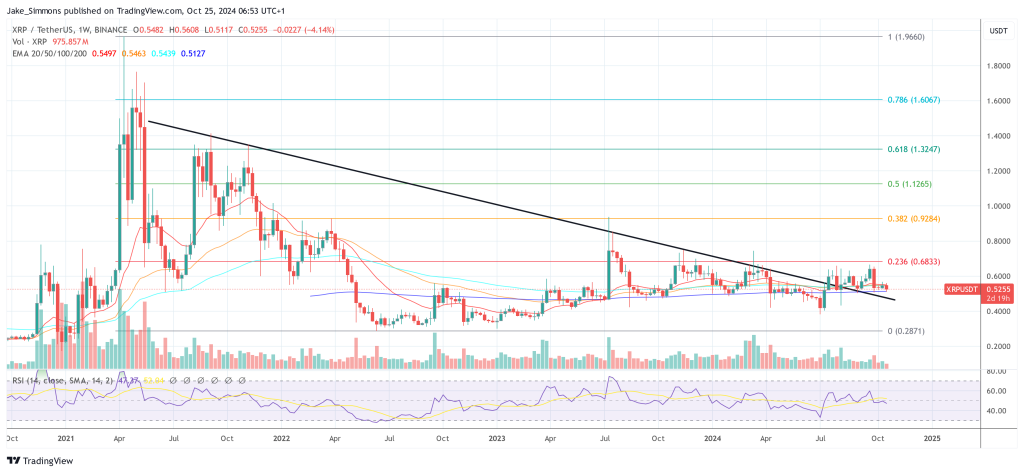As a seasoned researcher with years of experience delving into the intricacies of financial markets and regulatory compliance, I find myself captivated by Ripple’s latest move in its ongoing battle with the SEC. The company’s Pre-Argument Statement, filed on October 24, presents a compelling argument that could potentially reshape the crypto industry and provide much-needed clarity for all players involved.
On October 24th, Thursday, Ripple Labs submitted the Pre-Argument Statement (Form C) for their appeal case with the U.S. Securities and Exchange Commission (SEC). This document outlines the main points the company plans to argue in the appeal, which the appellate court will reconsider from scratch, not giving preference to the lower court’s decisions.
Ripple’s Four Key Issues On Appeal
The argument presented emphasizes four key points. Initially, the company argues against the interpretation of an “investment contract” as defined in Section 5 of the Securities Act of 1933. Ripple claims that for a transaction to qualify as an investment contract, it must meet three conditions: (1) It should be a binding agreement, (2) The seller should have obligations beyond the sale, and (3) The buyer should have the right to claim profits from the seller’s subsequent activities.
In the second point, Ripple contests the district court’s use of the Howey Test, which originated from the 1946 Supreme Court case SEC v. W.J. Howey Co. The company claims that the court made a mistake in deciding that certain XRP transfers fell under the definition of an investment contract. More specifically, Ripple questions whether money was invested, if there was a shared enterprise, and if profits were anticipated primarily due to the company’s efforts, rather than other factors.
Thirdly, the argument revives the “fair warning” defense. Ripple argues that they didn’t have clear notice that their actions breached Section 5, stating that there was widespread ambiguity about how federal securities laws applied to virtual currencies and other digital assets. Ripple accuses the SEC of being inconsistent and purposely unclear in their statements, which they claim added to this confusion.
Ultimately, Ripple disputes the clarity of the court order directed at it. The firm asserts that the order falls short of the specificity required by Rule 65 of the Federal Rules of Civil Procedure, since it simply instructs the company to comply with the law without offering clear guidance. Ripple maintains that such an order is overly broad and open to various interpretations, which could negatively impact its business activities.
Jeremy Hogan, an attorney supporting XRP, commented on the appeal regarding Ripple’s case, emphasizing that Ripple’s challenge to the definition of an investment contract could potentially have significant impacts across the cryptocurrency sector. He explained that Ripple is primarily focusing on this issue in the appeals court for the advantage of the broader crypto industry as a whole. Hogan also mentioned that a successful argument on this matter might not necessarily clear Ripple from the $105 million verdict against it, but could potentially weaken the SEC’s enforcement actions by necessitating that an investment contract should be a legally binding agreement.
Additionally, Hogan pointed out the revival of the ‘fair notice defense’ and Ripple’s objection to the clarity of the injunction. He commented, “What captures my attention is Ripple questioning whether the injunction is clear enough, considering it essentially states, ‘comply with the law.’ This appears to be a regular occurrence in securities law cases, but it doesn’t make sense as an injunction. It also suggests that Ripple prefers not to have this injunction affecting its operations.
Ripple’s Chief Legal Officer, Stuart Alderoty, clarified more about the company’s stance through X. He highlighted that the case isn’t centered around whether XRP is considered a security. “XRP, much like Bitcoin, has a clear status (exempt from being classified as a security),” Alderoty explained. “The SEC doesn’t contest this classification, which remains valid law.
He reassured stakeholders that the appellate court would review the existing record without the SEC introducing new evidence or demanding additional documents. “As we go through this process, please remember the SEC’s broader strategy: try to create distraction and confusion for Ripple and the industry,” he added. “But honestly, it’s just background noise now. The hard part of the fight is behind us. Ripple’s business is growing and getting stronger every day even as this appeal process plays out.”
As an analyst, I’m sharing some recent updates regarding the ongoing case involving the Securities and Exchange Commission (SEC) and XRP. The SEC has proposed a new deadline for submitting its primary argument, which is set for January 15, 2025. Furthermore, a legal representative known as John E. Deaton has filed a request to join the case as an amicus curiae (friend of the court) in the Second Circuit. In response to a question from FOX Business’ Eleanor Terrett about his potential involvement in other matters, such as Senate races, Mr. Deaton stated that he would not abandon this case, regardless of any other commitments he may have.
At press time, XRP traded at $0.5255.

Read More
- FIS PREDICTION. FIS cryptocurrency
- LUNC PREDICTION. LUNC cryptocurrency
- Luma Island: All Mountain Offering Crystal Locations
- Tips For Running A Gothic Horror Campaign In D&D
- EUR CAD PREDICTION
- DCU: Who is Jason Momoa’s Lobo?
- XRP PREDICTION. XRP cryptocurrency
- How to Claim Entitlements In Freedom Wars Remastered
- OSRS: Best Tasks to Block
- 13 EA Games Are Confirmed to Be Shutting Down in 2025 So Far
2024-10-25 09:41